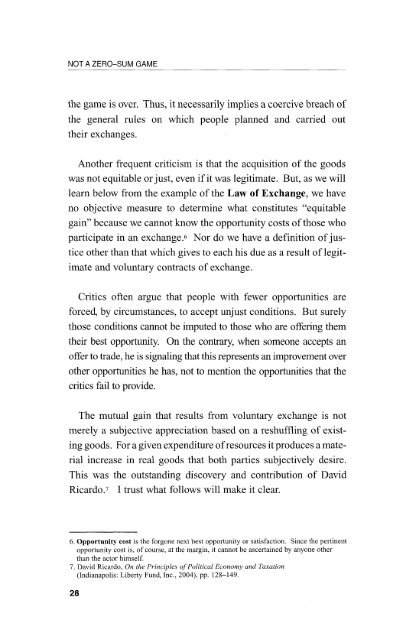Not a Zero-Sum Game - Ludwig von Mises Institute
Not a Zero-Sum Game - Ludwig von Mises Institute
Not a Zero-Sum Game - Ludwig von Mises Institute
Create successful ePaper yourself
Turn your PDF publications into a flip-book with our unique Google optimized e-Paper software.
NOT A ZERO-SUM GAME<br />
the game is over. Thus, it necessarily implies a coercive breach of<br />
the general rules on which people planned and carried out<br />
their exchanges.<br />
Another frequent criticism is that the acquisition of the goods<br />
was not equitable or just, even if it was legitimate. But, as we will<br />
learn below from the example of the Law of Exchange, we have<br />
no objective measure to determine what constitutes "equitable<br />
gain" because we cannot laow the opportunity costs of those who<br />
participate in an exchange.6 Nor do we have a definition of jus-<br />
tice other than that which gives to each his due as a result of legit-<br />
imate and voluntary contracts of exchange.<br />
Critics often argue that people with fewer opportunities are<br />
forced, by circumstances, to accept unjust conditions. But surely<br />
those conditions cannot be imputed to those who are offering them<br />
their best opportunity. On the contrary, when someone accepts an<br />
offer to trade, he is signaling that this represents an improvement over<br />
other opportunities he has, not to mention the opportunities that the<br />
critics fail to provide.<br />
The mutual gain that results from voluntary exchange is not<br />
merely a subjective appreciation based on a reshuffling of exist-<br />
ing goods. For a given expenditure of resources it produces a mate-<br />
rial increase in real goods that both parties subjectively desire.<br />
This was the outstanding discovery and contribution of David<br />
Ricardo.7 I trust what follows will make it clear.<br />
6. Opportunity cost is the forgone next best opportunity or satisfaction. Since the pertinent<br />
opportunity cost is, of course, at the margin, it cannot be ascertained by anyone other<br />
than the actor himself.<br />
7. David Ricardo, On the Principles of Political Economy and Taxation<br />
(Indianapolis: Liberty Fund, Inc., 2004), pp. 128-149.

















